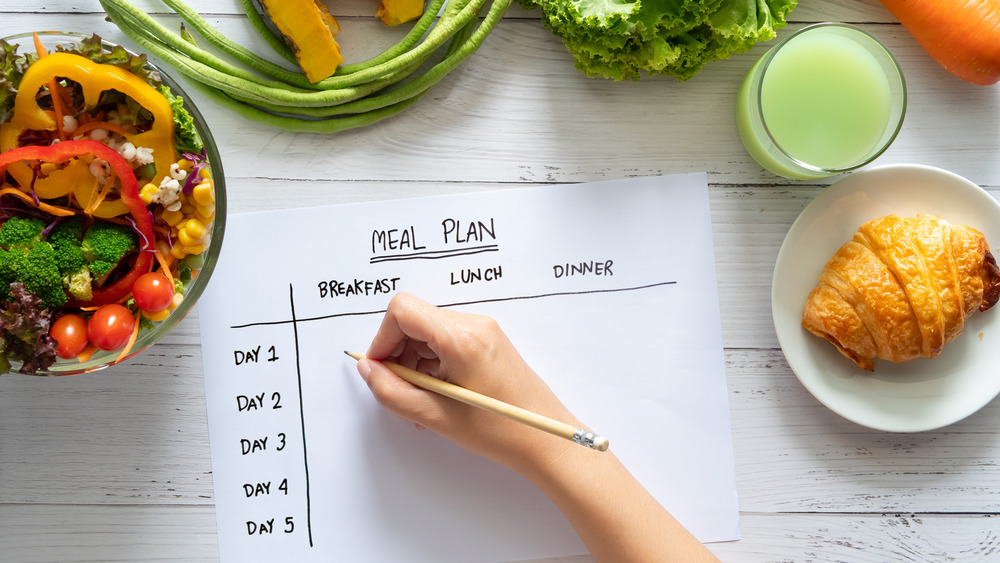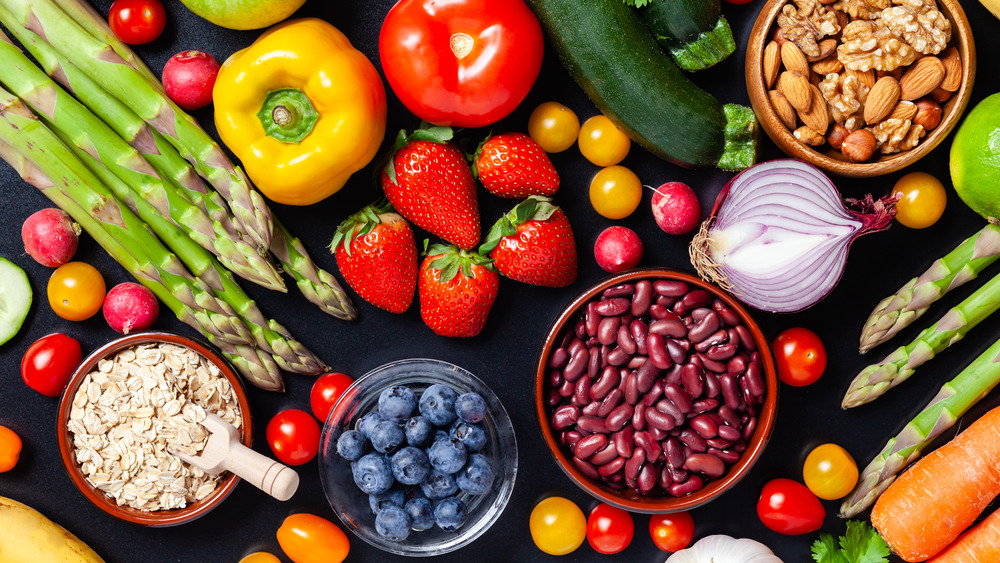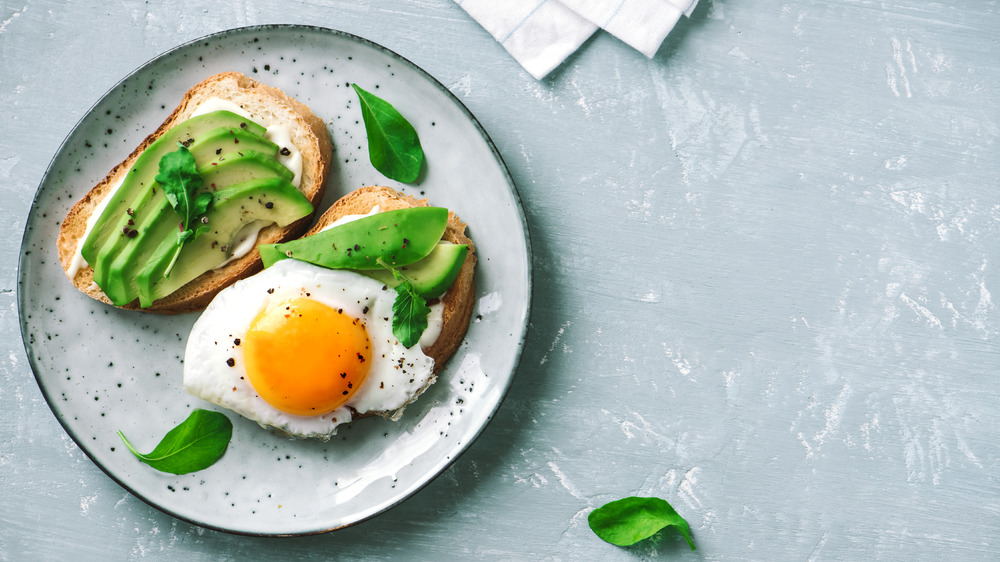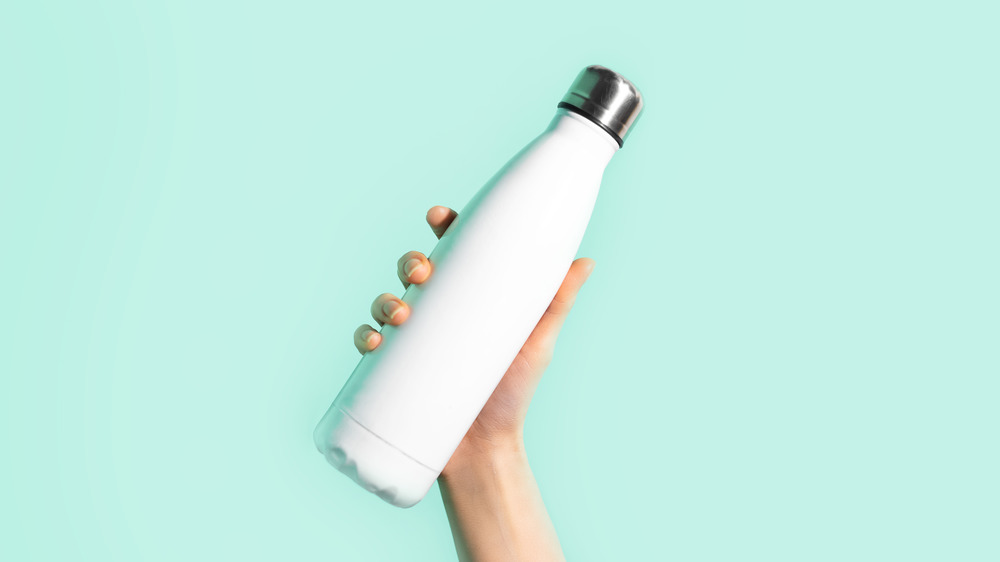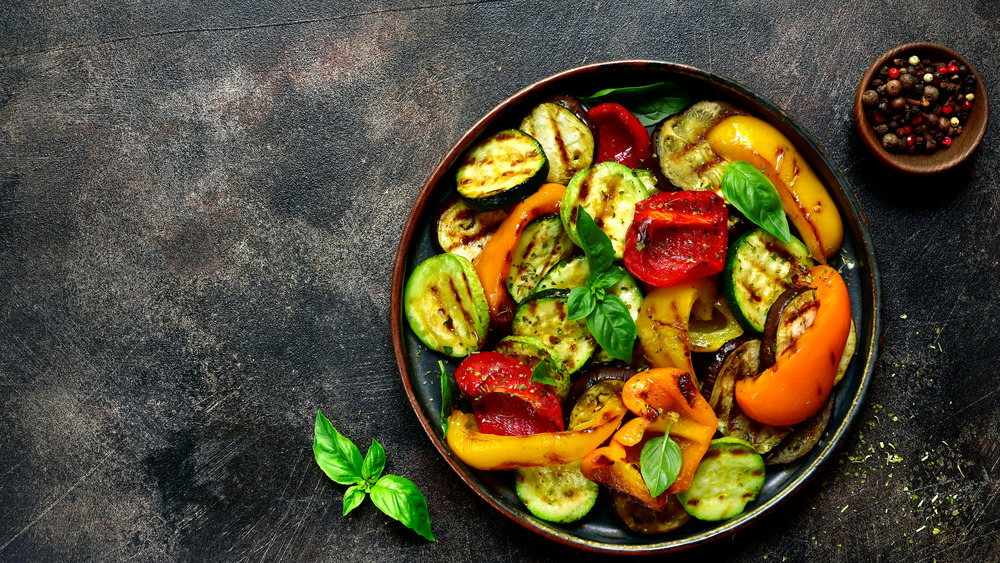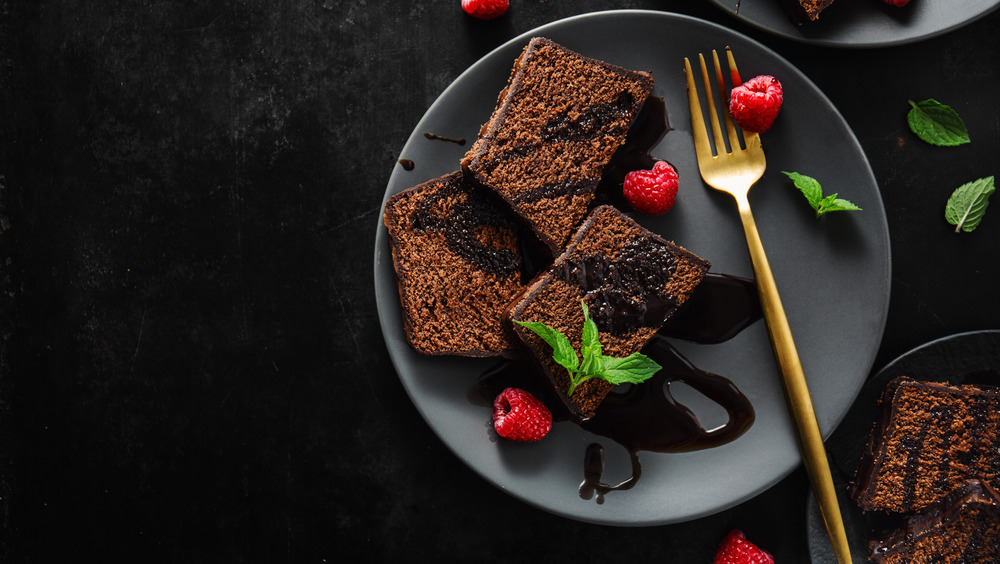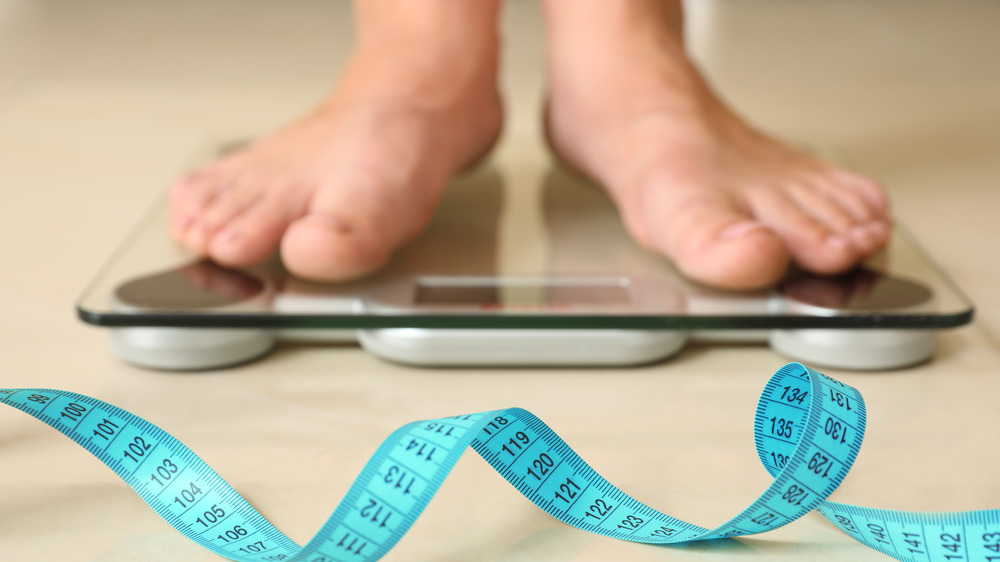You're More Likely To Lose Weight If You Have Any Of These Habits
Having habits like eating healthy, exercising regularly, and living a healthier lifestyle means you can expect to reap the rewards for your hard work. You hope that the pounds will instantly fall off, and your goal to be reached shortly thereafter. Easy-breezy, right?
Well, no, not exactly. Anyone who has ever successfully (or not-so successfully) attempted to lose weight and keep it off knows that it is a whole lot easier said (and planned) than done. There can be quite a few caveats that make your journey a bit bumpier and a whole lot more difficult. Temptation, hidden calories, hormones, and a lack of Zzz's are just a few of the things that can stand in your way.
Fortunately, there are some simple habits you can adopt to help you along the way. From jotting down the tiny nibbles you otherwise would neglect to acknowledge to bulking up your plate with extra veggies, here are a few tips, tricks, and tactics to try.
Plan your meals
If you are hoping to lose weight, you should understand that, despite many differences, at their core, all diet plans seek to help you take in fewer calories than you burn. This may sound simple, but it can actually be a rather challenging feat; because, as explained by Healthline, you also want to make sure that you are getting the building-block essentials your body needs to stay strong and healthy. This is exactly why and how meal planning can help ensure your pound-dropping success. You can find the recipes that work for you and calculate those all-important calories and nutrients before you begin eating.
So how does one get started with meal planning? Jot down proposed meals or, better yet, find an app that does the math for you. This will help you get a grocery list ready and even enable you to cook in batches and freeze portions in advance. You can find the system that works for you, and adjust as necessary. What's more, having your meals (and even snacks) pre-established will help deter you from impulsively consuming an entire pizza or ravenously attacking a bag of chips.
Have set snacks but don't graze all day
Snacks are important. They keep us energized and satisfied between meals, while we are out and about, and on the go.
Of course, while some smart snacking can help stave off hunger, regulate blood sugar, and, ultimately, help with your weight loss goals, excessive grazing and fridge raiding can completely sabotage your efforts. Note that even some foods that are labeled as low-fat or fat-free can actually boast tons of sugar — so familiarize yourself with labels and, when possible, choose whole foods over processed ones. A great go-to option: Nuts. They are chock full of nutrients and will leave your belly feeling full. As Harvard Health warns, however, "Nuts have lots of calories, though, so keep portion sizes small."
What's more, think before you snack. Make sure that you are actually hungry before throwing cookies into your mouth, and try not to make it a habit of mindlessly noshing while watching television or scrolling on your phone (via Harvard Health).
Make mealtime a sit-down event
These days, most of us are perpetually on the go. We are busy, we are hustling, and we barely have the time to eat a healthy meal, let alone sit down to make it a relaxing event. But taking a moment to sit still and be more mindful during your meals may help you in your weight loss pursuit.
An analysis of 24 studies done in The American Journal of Clinical Nutrition concluded that distracted eating results in the consumption of more calories. On the other hand, "attentive eating" helps people rein it all in. So how can you be a more mindful mealtime eater? Start by being grateful for the food before you and chew slowly to take in all the flavor nuances, as advised by Harvard Health.
What's more, just sitting down could be beneficial. While it's true that you do burn more calories while standing, sitting during a meal may help you slow down, consume less, and allow you to process that feeling of satiation, as revealed by a trial in The Journal of the Academy of Nutrition and Dietetics.
Grocery shop on a full tummy
We have all done it — wandered the aisles of the grocery store impulsively scooping up savory, sweet, and salty snacks galore. It is never a good idea to buy food when you are hungry. Instead, if you are trying to lose weight, go to the store and grab your essentials after eating. A study, sourced by Reuters, discovered evidence that claims people are keener to buy high-calorie snacks and foods when they have not eaten in a while. Furthermore, the research also found that individuals are more likely to buy unhealthy items later in the day, as dinnertime approaches. So if you really want to be successful in your regimen, shop full and shop early.
Amy Yaroch, of the Gretchen Swanson Center for Nutrition in Nebraska, also advises going to the supermarket with a list in hand so that you are not as tempted to stray from the basics that you need versus the delights you may want (via Reuters).
Eat breakfast
Your mom was telling the truth: breakfast really is the most important meal of the day — especially if you are trying to shed some unwanted weight.
According to WebMD, 75 percent of those who drop over 30 lbs and maintain their loss over time, report having breakfast daily. This may seem counter-intuitive since weight loss is achieved through a calorie deficit. But the simple fact is that depriving yourself in the morning is just going to make you hungrier in the afternoon. And, as pointed out by registered dietitian, Leigh Tracy, you are more likely to make bad diet decisions when you are absolutely famished. This is why Tracy recommends choosing a breakfast that's chock full of protein and fiber — to keep you satiated for longer. Of course, you'll want to think twice before opting for waffles, muffins, boxed cereals, and other sugary options that lack the necessary nutrients to fuel your body (via Healthline).
What's more, eating a healthy breakfast primes you for a healthy day. It sets the bar and establishes expectation. Additionally, regularly skipping breakfast is correlated with a lower level of physical activity.
Drink water all day, every day
Thirsty? Drink water. Not thirsty? Drink water anyway. Want to lose weight? Have another glass of — you guessed — it water.
An analysis of multiple studies published in The American Journal of Clinical Nutrition determined that upping your water intake whilst actively trying to lose weight can help you achieve your goal. And it turns out that there are a few solid reasons that good old-fashioned calorie-free H2O has this assisting effect.
As noted by Medical News Today, first and foremost, drinking water can make you feel fuller and help suppress the desire to snack. Additionally, water can help your body speed up its natural calorie-burning process and enable the metabolization of fat. Hydration is also a catalyst for waste removal — keeping your body flushed and regular. Finally, swapping out soft drinks, juices, and other calorie-laden drinks for water is a super simple way to create that all-important calorie deficit you need for weight loss.
Go heavy on the veggies at mealtime
If you have a hearty appetite, you do not have to go hungry. Yes, portion control is important when you are trying to watch your weight, but there are other ways to jazz up your mealtime plates without sacrificing your diet or allowing your tummy to rumble perpetually.
As advised by the Centers for Disease Control and Prevention (CDC), "vegetables, fruit, and whole grains should take up the largest portion of your plate ... This will reduce the total calories in your meal without reducing the amount of food you eat." Chock full of filling water and fiber, produce should be central at mealtime. Exchange one egg for more veggies in your morning omelet, replace cheese or extra meat with lettuce and tomato in your lunch sandwich and swap a cup of rice for a cup of steamed greens at dinner time. These are simple ways to bulk up your dish without, you know, bulking up your body at the same time.
Get some active Vitamin D time
Trying to lose some stubborn weight? Get outside, breathe in the fresh air, enjoy the sunshine on your skin, and maybe consider adding a Vitamin D supplement to your daily routine.
A study published in The American Journal of Clinical Nutrition found that women who take Vitamin D while assuming a weight loss program tend to lose more pounds than those who do not take the supplement. As noted by Healthline, the research is still in its infancy, but early evidence indicates that Vitamin D may foster weight loss by changing fat cells and boosting the production of certain hormones. The answers are not entirely clear, but it has become clear to many in the medical field that there is a strong relationship between weight and Vitamin D, a macronutrient that is not present in many foods but can be naturally produced when the body is exposed to sunlight or taken as a supplement. It is also worth noting that obese individuals tend to have low levels of Vitamin D.
Embrace some physical activity
Working out can assist in your pursuit to lose weight. As explained by Healthline, physical activity can boost your metabolism and help you burn more calories. But in order to be effective, it is best when exercise is accompanied by smarter diet choices.
You should try to get at least 20 minutes of cardio every day, as recommended by the site. Of course, more is more in this instance. If you are exercising with a weight loss goal, you will need to remember that you will want to keep that calorie deficit — no splurging on an ice cream sundae after taking a 30-minute spin class. Of course, there are ways to get your fitness on without overtly training. Go for a nature walk, commute to work on a bicycle, and opt for the stairs when possible. These small changes may seem insignificant, but, together, they can help you squeeze in extra exercise and burn more calories throughout the day.
Prioritize sleep at night
Unfortunately, in this stressful day and age, too many of us are sleep deprived. There are plenty of consequences that accompany a lack of z's, one of which is an abundance of unwanted pounds. An analysis published in the journal Sleep found that, yes, irregular and poor sleep directly drives "risk of obesity" in both "children and adults."
And, as it turns out, there are a few reasons that insufficient shut-eye can make you pack on some extra pounds. First, as explained by WebMD, being tired sets you up for poor judgment. You are more prone to making bad eating choices when you are feeling sluggish and desperate for a pick me up. What's more, your metabolism slows down when you are essentially running on fumes.
Finally, as noted by Healthline, sleep helps improve your ability to perform physically. More sleep can lead to enhanced exercise and more calories burned. Furthermore, not getting sleep may hinder your motivation to move at all.
Keep a support system
Committing to a weight loss plan can be challenging. Sticking to it can be even harder. One way that many people find success and sustainability in their pursuit: having a support system and friends to turn to.
As explained by Mayo Clinic, you can take this to mean multiple things. Perhaps it is empathy you are looking for — if you just want a friend to confide in and share with, that's fine. Or, maybe you want someone to actively exercise and diet with you. Either way works — so you do you. Seek out a virtual community or hit up the gym with a real-life friend.
It is as simple as getting the affirmation you need on your weight loss journey. A study in the Health Informatics Journal 2found that encouraging, positive text messages can even help lift one's spirits and help them maintain the resolve to continue on with their efforts.
Embrace an occasional dessert, but eat it with a fork
If a sweet tooth stands between you and your desired weight, it may be possible to have your cake and slim down, too.
Depriving yourself of anything can eventually backfire, so allow yourself to enjoy the occasional treat. Just use sense, practice portion control, and choose your sweets wisely. Registered dietitian and sports nutritionist Molly Kimball warned WebMD that selecting something that's very indulgent and high in sugar could lead to even more cravings.
But if you want to go all out with your dessert, there is another way to rein in your brownie, cookie, and sundae splurging — use a fork. A study in the Journal of the Association for Consumer Research found that eating with a spoon encourages people to consume larger scoops. A fork, on the other hand, allows one to "focus on the oral sensations they experience while eating." It's about being mindful and enjoying each bite of your dessert. Furthermore, less food can "adhere to the cutlery surface," – meaning you will likely take in less.
Weigh yourself daily
There is a lot to consider when you are starting a diet plan. The number that appears on the scale is just one consideration; it should not dominate your decision-making or affect your overall attitude.
Of course, appropriately tracking your weight so that you can measure your progress can be a helpful habit. A study published in The Journal of the Academy of Nutrition and Dietetics found that getting on a scale daily can yield the more persistent "adoption of weight control behaviors" and, ultimately, result in more long-term success. Similar research in the International Journal of Behavioral Medicine found that daily weigh-ins had a positive effect on weight loss for obese individuals over a two-year period of time.
Just remember that there are several other factors to keep in mind. Sometimes we hit a plateau in our pursuit, and the scale simply will not budge for a period of time. And if you are working out consistently, you may be gaining muscle while losing fat; the scale is not able to differentiate between the two (via Healthline).
Keep a food journal
Mindful eating may not be enough. Chronicling all the meals, snacks, and extras you eat throughout the day might be a better way to make sure that you are accounting for everything in your daily diet. In fact, research in the journal Obesity has shown that this method of "self-monitoring" can have a positive effect on weight loss.
Professor of Medicine Dr. Victoria Catenacci told WebMD that "people don't realize how many calories they are obtaining from caloric beverages and snacks," and simply writing everything down can be eye-opening. Furthermore, psychologist Sherrie Delinsky said that keeping a journal can reveal a pattern of unhealthy habits and offer insight on potential triggers.
Health researcher Victor Stevens, Ph.D., explained that knowing that you will share your food diary with another person — be it doctor or dietitian — is yet another way to up the ante and motivate you to stay on track (via WebMD). Either way, you have to be honest with yourself and with anyone you consult with.


